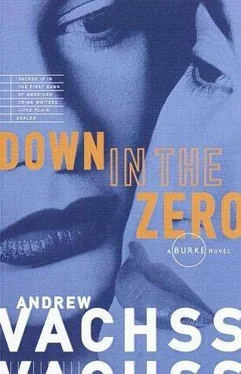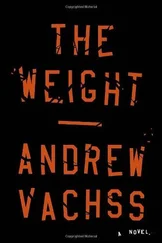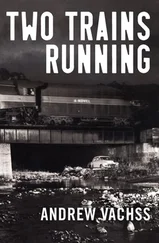Even up close, I couldn't find the seam. The white veins in the pink marble pulled my eyes into a swirling pattern, the recessed lighting bouncing off the slick surface blurred my eyes. Like the random stripes of a herd of zebra, making the lions dizzy, distracting the hunters from the target.
A four–digit code. Ten thousand chances to hit it by luck— no chance at all. I punched the Open Sesame again, one slow button at a time. The panel was about six inches wide. Inside was painted a flat black, a matte finish that would eat light, no reflection.
I pulled a thick white towel from a standing brass rack, laid it down in the tub in case something spilled. I started to reach my gloved hand inside the compartment when I remembered this was too elaborate a setup for a rich woman to hide her pearls. And remembered where Cherry came from, what she'd know.
I walked downstairs, looking around. What I really wanted was a pair of needlenose pliers, but the kitchen didn't have anything like a tool kit. Finally, I settled on a pair of long barbecue tongs, heavy steel with a rosewood handle.
Back upstairs, I used my pencil flash to check out the inside of the compartment. I could see some plastic cassettes, a padded jewelry box, and what looked like a black drawstring pouch. I wasn't worried about a burglar alarm— if I was right, the cops were the last thing Cherry would want if somebody got this far. I probed the air space inside the compartment with the tongs, testing.
Nothing happened.
I extended the tongs toward the pouch again, as delicate as plucking a butterfly off a flower. I closed the tongs slowly, standing well back. I felt the tips touch something and there was a sharp clang! It almost knocked the tongs from my hand. I pulled them back, used the pencil flash. A curved metal wand hung just over the pouch, still vibrating, three separate hooked tips pinpointing the light. An L–shaped lever dangled from the far corner of the compartment. I pushed it back toward the wall with the tongs. Watched as the wand retreated. Whatever it was, it could be reset.
The tips of the wand looked surgical. I could guess what she had painted on them— curare lasts a hell of a long time, but it only takes a few seconds to do its job. I shoved the lever back to disable the wand. Then I worked the stuff out of the compartment like I was defusing a bomb, working front to back. My hands were calm, but my knees were locked against the trembling. I dropped each piece lightly on the heavy towel in the same position it was inside the compartment.
Three VHS videocassettes. Blackmail maybe?
Seven audiotapes, premium–grade metal, ninety minutes each. The blackmail scenario looked better than ever.
A round disk I didn't recognize.
A pair of three–and–a–half–inch computer diskettes, Teflon coated, one red, one blue.
A mini–cassette backup computer tape.
Business records, maybe? Of somebody else's business? Had to be some pretty hot data to be this well protected. Industrial espionage?
No matter what all the stuff was, there was no way I could tell just by looking.
But then I found the black velvet pouch.
I gently pulled the drawstring, tipped the pouch upside down. Fire inside: red, white, green. Gems. Big ones, all faceted. And some smooth black stones.
I glanced over at the clock. 6:39. Enough.
I took one of each of the gems, one of each of the cassettes, both diskettes. Put everything else back in reverse order. If you took a quick look inside, it would look pretty close to normal. I pushed the lever home, watched the poison wand disappear, heard it snap into place. Then I went back to the control panel, pushed the buttons, and made the compartment disappear.
I carefully wrapped the gems in a piece of dark blue felt I carry with me for emergencies. The loot disappeared into the pockets of my jacket. The towel went back on the rack. I pulled off the surgeon's gloves and headed downstairs.
It only took me a few minutes to lock the stuff in the false bottom of the Plymouth's truck, right next to the fuel cell. I never went back to the upstairs apartment.
I was getting a traffic report from the all–news station by 7:08, heading for home base.
As soon as I crossed the bridge into Manhattan, I found a pay phone and started to work. Left messages for Michelle and the Prof. Called Mama, told her I'd be on my way before nightfall.
By eight, I was in my office, sacked out on the couch.
It was almost three in the afternoon as I worked the Plymouth through the maze of Chinatown's back streets. Clarence's immaculate BRG Rover was parked in the alley behind Mama's.
They were in my booth. The Prof had three playing cards in front of him, folded lengthwise, face down, showing Clarence the finer points of three–card monte. Mama was at her cash register. The joint had the usual number of customers— none.
I sat down in my booth, ignoring the questions in the Prof's eyes. Mama strolled over just as I was pulling the blue felt from my pocket. She nodded, snapped something in Cantonese to one of the hovering waiters, and sat down.
The blue felt sat between us on the table— Mama made no move to touch it. In a couple of minutes, the waiter came back. He cleared the table, wiped it down, spread a brilliant white bolt of heavy cloth over the top. Then he placed a black metal cube near Mama's left hand, spread a red silk square next to her right. Mama bowed her head, fingertips together, waiting. The waiter opened the top of the black metal cube, telescoped a long stem with a tiny quartz halogen light at the tip. He pressed a button on the side of the cube and a circle of pure light showed on the tabletop. On the red silk square, he carefully assembled a jeweler's loupe and several different–size tweezers. From one of his apron pockets, he took a miniature scale with an electronic dial. He placed it at the far corner of the table and stepped back.
Mama raised her head, opened her eyes. Nodded an okay at me. I unwrapped the gems. Mama plucked the diamond first, placed it on the table in front of her. Then she screwed the loupe into her right eye, picked up the gem with a pair of tweezers and took a look.
Nobody spoke.
Mama turned the gem back and forth with the tweezers, her fingers precision machinery.
"You remember what I teach you about diamonds? Five C?"
"Sure," I told her, remembering the lesson from so many years ago, when I came back from Africa and told Mama about new smuggling opportunities. Four C was the world standard: color, clarity, cut and carat. The last C was Mama's own— cash.
Mama nodded acknowledgment as she worked. After a couple of minutes, she put the rock down. Her smile was brighter than the light.
"Very fine stone."
"It's for real?" I asked her.
"Oh yes. Blue–white, brilliant cut. Maybe VVS, VS for sure. Three carats, pretty close."
"How much?"
"A hundred thousand, quick." Meaning it was worth a quarter million.
"What about the others?"
Mama didn't reply. She reluctantly put the diamond on a corner of the cloth, reached for the green. She did the same routine, switched to the red. Finally, she took up the smooth black stone, rubbing it between her fingers. After a few minutes, she switched off the light, looked across at me.
"All perfect stones. Ruby is pigeon blood, probably from Burma. Emerald is Colombian for sure. Very big stones to be so perfect."
"What's this?" I asked, touching the smooth black stone with a fingertip.
"Girasol," Mama said. "Black opal. From Australia."
"There's more," I told her. "This is just a sample."
"Passport," Mama said. I knew what she meant. There's no harder currency than fine gems. A universal language— you could turn these into cash anywhere from Bermuda to Bangkok.
Читать дальше












